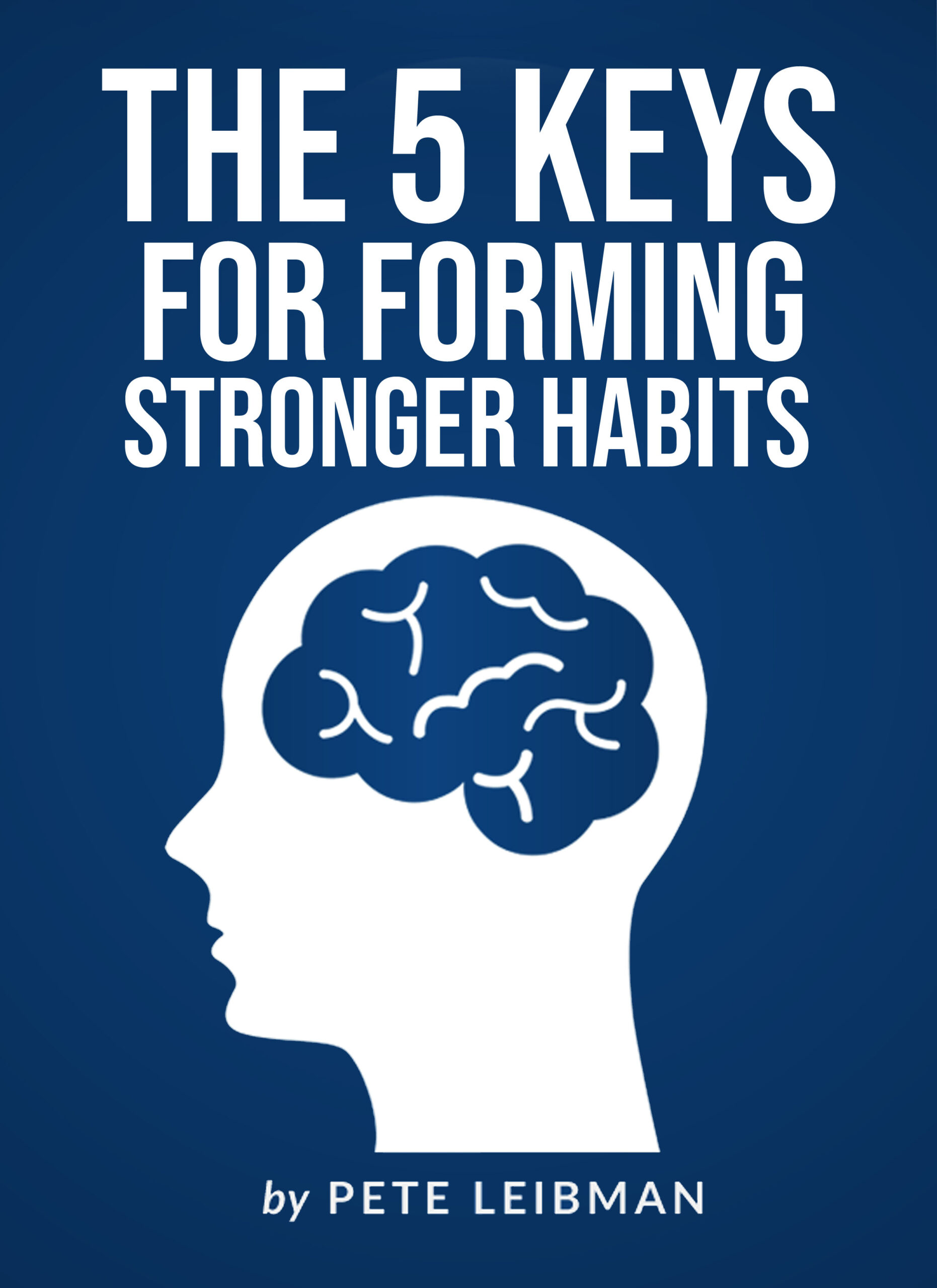
How often do you keep commitments that you make to yourself and to other people?
Some people only follow-through when they are “in the mood” or when it is convenient. Others only follow-through if they remember to do so.
I was often guilty of the latter when I was in my twenties. One day, my girlfriend at the time told me that she didn’t feel like she could trust me because of how often I was late or forgetful.
No one had ever questioned my trustworthiness before, so her comment really got my attention. It ended up being a major turning point for me. These days, I am absolutely maniacal about keeping promises made to myself and to other people.
We all recognize the personal and professional consequences of not following through on “major” commitments. However, every broken commitment erodes the trust that you have in yourself and the trust that other people have in you.
You have “trust bank accounts” with yourself and with each person that you deal with personally and professionally. Each time that you keep a commitment, you make a deposit into these accounts. Each time that you fail to follow-through, you make a withdrawal from these accounts. Over time, these deposits or withdrawals add up and have a monumental impact on your self-image and your reputation, in addition to your results in every area of your life.
Greater accountability leads to greater trust and greater results. This is indisputable. The question is “how can you hold yourself more accountable?” In this article, we’ll look at the ultimate way to do so: decide that you will honor every commitment that you make.
Why should you honor every commitment?
Years ago, I decided that my goal would be to honor every commitment that I make. Since then, I cannot tell you how often this approach has reinforced commitments that I might have bailed on earlier in my life. I also cannot measure the positive impact that this approach had had on my “trust bank accounts,” nor can I measure how much time and energy this approach has saved me.
If you don’t honor every commitment, how do you know when it is okay to break a promise and when it is not? How can you build trust with other people and with yourself? Is it not simpler, and in your best interest, to decide that you will honor every commitment that you make, no matter how big, how small, or to whom?
When you honor every commitment, you will not waste any time or energy deciding what counts and what does not, you will never have to deal with the inevitable guilt from breaking a promise, and the trust that you have in yourself, and that others have in you, will grow exponentially.
Of course, there are exceptions. For example, if you commit to a workout (or any other commitment), but your child gets sick and needs to go to the hospital, you would obviously change your schedule and put your child’s well-being first. What you should not do, however, is blow off a scheduled workout (or any other commitment) if you are simply not in the mood when the time comes, or if it becomes difficult to follow-through. Forgetting about a commitment is not a legitimate excuse either.
When it comes to keeping promises made to yourself and to others, the goal must be perfection- a word not to be used lightly. If you break a commitment, there better be a damn good reason. (If this sounds too harsh, read this article to understand my intention for being so demanding.)
How can you honor every commitment?
If you are wondering how you can keep every promise that you make, it is simple. Do not commit in the first place unless you are willing and able to do whatever it takes to make it happen.
Before you make any commitment, ask yourself, “Am I 100 percent certain that I am willing and capable of honoring this?” The answer to that question should often be “no” or “I am not sure yet.” That’s completely fine. Many times, “yes” is the wrong answer, even though that might be hard to admit to yourself or uncomfortable to say to someone else.
When you do decide the answer is “yes” though, let that be the end of it. There should not be any debate or bail-outs when the time comes to follow-through. It is irrelevant whether you get really busy or are not in the mood. When your commitment is to another person, it also does not matter whether that person is homeless or a billionaire. Once you make a promise, keep it.
Will this approach be difficult? Absolutely. Will this approach be worth it? Absolutely.
Beware of a top cause of broken commitments
As part of my research for my book Work Stronger, I asked over 100 prominent leaders if I could interview them. Of those that I contacted, about half ended up participating and about half did not. As for those who did not, they fell into three categories.
- Some people responded (or had their assistants respond) to tell me they would be unable to participate due to other commitments.
- Some people never responded to my interview requests.
- Some people agreed to be interviewed, but failed to follow-through.
How do you think I viewed each of these groups, and which people do you think I respected the most? Well, the people who responded to say “no” (or who had their assistant say “no”) earned the most points in my book. I appreciated their response, even though it was not the answer that I wanted. Next was the people who didn’t reply at all. Their lack of response left me wondering if they actually got my messages. The people who disappointed me the most were those who said “yes” at first, but who failed to follow-through on their promise.
Beware of over-committing. There’s nothing admirable about making a commitment that you ultimately fail to keep. It’s more admirable to never make the commitment in the first place.
Remember this if you find it difficult to say “no.” You will disappoint someone else (or yourself) much more by saying “yes” and not following through, than you will by saying “no” in the first place.
This doesn’t mean that you should set the bar low on your internal or external commitments. This just means that setting the bar too high is a recipe for disappointment.
Reality check
Some people might read this article and brush all of this off as common sense. However, as best-selling author Brendon Burchard likes to say, “Common sense is not always common practice.”
Many people fail to follow-through on commitments much more often than they might realize. What about you? Here are a few questions to ask yourself to analyze how good you really are at keeping your commitments:
- If you aren’t “in the mood” to follow-through, do you typically still follow-through anyway, or do you use your mood as an excuse for breaking your commitment?
- If you get “really busy,” do you still find a way to follow-through, or do you use your “busy-ness” as an excuse for breaking your commitment?
- How often do you forget about promises that you made to yourself or to other people?
- How often do you have to bail on a commitment because you over-committed?
If you are not satisfied with your answers to these questions, why not make the decision to honor every commitment that you make from this day forward?
Summary
It is simpler, and in your best interest, to decide that you will honor every commitment that you make, no matter how big, how small, or to whom.
If you don’t honor every commitment, you will waste time and energy deciding which promises to keep and which you can break. You’ll also make more withdrawals from your “trust bank accounts,” and you’ll experience more guilt from broken promises.
As Jocko Willink and Leif Babin write in Extreme Ownership: How U.S. Navy Seals Lead and Win1, “Discipline—strict order, regimen, and control—might appear to be the opposite of total freedom—the power to act, speak, or think without any restrictions. But, in fact, discipline is the pathway to freedom.”
You can make excuses, or you can get results. You cannot do both. Honor every commitment that you make. Every. Single. One.
P.S. If you enjoyed this article, check out my free 40-page eBook and newsletter below.

Free eBook and Newsletter
Download my free 40-page eBook on “The 5 Keys for Forming Stronger Habits.”
You’ll also receive my free weekly newsletter on how to become your strongest self.
Your email is safe. Unsubscribe anytime.
About the author: Pete Leibman is the Creator of StrongerHabits.com. He is a best-selling author, keynote speaker, executive recruiter, athlete, and peak performance coach. His work has been featured on Fox News, CBS Radio, and CNNMoney.com, and over 500,000 people across the world have read his articles.
References for this article:
- Jocko Willink and Leif Babin, Extreme Ownership: How U.S. Navy Seals Lead and Win (New York: St. Martin’s Press, 2015), 274.

